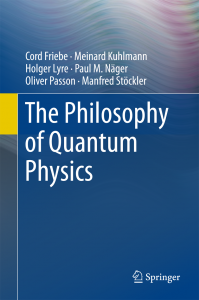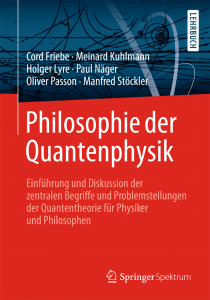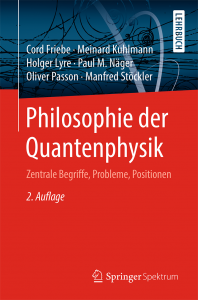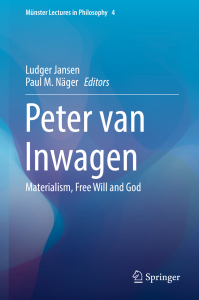Clicking on ► displays the abstract of a publication.
Authored Books |
|||
| Näger, Paul M. (forthcoming). Quantum Entanglement and Causation. Boston Studies in the Philosophy of Science. Cham: Springer. | |||
Friebe, C., M. Kuhlmann, H. Lyre, P. M. Näger, O. Passon and M. Stöckler (2018). Philosophy of Quantum Physics. Cham: Springer International. This book provides a thorough and up-to-date introduction to the philosophy of quantum physics. Although quantum theory is renowned for its spectacular empirical successes, controversial discussion about how it should be understood continue to rage today. In this volume, the authors provide an overview of its numerous philosophical challenges: Do quantum objects violate the principle of causality? Are particles of the same type indistinguishable and therefore not individual entities? Do quantum objects retain their identity over time? How does a compound quantum system relate to its parts? These questions are answered here within different interpretational approaches to quantum theory. Finally, moving to Quantum Field Theory, we find that the problem of non-locality is exacerbated. |  |
||
Friebe, C., M. Kuhlmann, H. Lyre, P. M. Näger, O. Passon and M. Stöckler. Philosophie der Quantenphysik. Heidelberg: Springer Spektrum. Dieses Buch liefert dem Leser eine aktuelle und fundierte Einführung in die Philosophie der Quantenphysik. Obwohl sich die Quantentheorie durch spektakuläre empirische Erfolge auszeichnet, wird bis heute kontrovers diskutiert, wie sie zu verstehen ist. In diesem Werk geben die Autoren einen Überblick über die zahlreichen philosophischen Herausforderungen: Verletzen Quantenobjekte das Prinzip der Kausalität? Sind gleichartige Teilchen ununterscheidbar und daher keine Individuen? Behalten Quantenobjekte in der zeitlichen Entwicklung ihre Identität? Wie verhält sich ein zusammengesetztes Quantensystem zu seinen Teilen? Diese Fragen werden im Rahmen verschiedener Deutungsansätze der Quantentheorie diskutiert. Ein Ausblick in die Quantenfeldtheorie verschärft das Hauptproblem der Nichtlokalität. |
|||
| 2015: 1st edition |  |
||
| 2018: 2nd edition (revised and enlarged) |  |
||
Edited Books |
|||
Jansen, Ludger, and Paul M. Näger (2018). Peter van Inwagen: Materialism, Free Will, and God. Cham: Springer. This book discusses the philosophy of influential contemporary philosopher Peter van Inwagen. Looking at perennial philosophical problems from a modern point of view, Peter van Inwagen’s philosophy masterfully combines positions that have been considered irreconcilable: incompatibilism concerning free will, materialism, organicism, theism and realism concerning fictional entities. As readers will discover, his arguments are witty, surprising and deep. |  |
||
Articles |
|||
Näger, Paul M. (under review). The Mereological Problem of Entanglement. Preprint. philpapers.org/rec/NGETMP |
|||
Näger, Paul M., and Dominic Eickhoff (forthcoming). Large Language Models im Archiv: Prompt Engineering für Archivar:innen [Large Language Models in Archives: Prompt-Engineering for Archivists]. Digital Humanities im deutschsprachigen Raum (DHd) 2025 |
|||
Näger, Paul M., and Niko Strobach (forthcoming). A Taxonomy for the Mereology of Entangled Quantum Systems. Journal for General Philosophy of Science. |
|||
Näger, Paul M. (2023) Paradoxien der Quantenmechanik. Das Einstein-Podolsky-Rosen-Paradox [Paradoxes of Quantum Mechanics. The Einstein-Podolsky-Rosen Paradox]. In A. M. Bauer, G. Damschen, and M. Siebel (eds.), Paradoxien: Grenzdenken und Denkgrenzen von A(llwissen) bis Z(eit), Brill / mentis, 97–124. |
|||
Näger, Paul M. (2022). Evidence for Interactive Common Causes. Resuming the Cartwright–Hausman–Woodward debate. European Journal for Philosophy of Science. 12(1): 2. [OA] |
|||
Näger, Paul M. (2020). A Stronger Bell Argument for (Some Kind of) Parameter Dependence. Studies in the History and Philosophy of Modern Physics. 72, 1–28. [Preprint] |
|||
Näger, Paul M. (2020) Was ist ein Naturgesetz? Nancy Cartwright [What Is a Law of Nature? Nancy Cartwright]. In Johannes Müller-Salo (ed.), Analytische Philosophie, UTB, 57–76. In unserer Welt laufen Vorgänge nicht beliebig, sondern nach ganz bestimmten Regeln ab („Naturgesetze“). Was genau ein Gesetz ist, ist eine viel diskutierte Frage in der zeitgenössischen analytischen Philosophie, insbesondere in den Disziplinen Wissenschaftsphilosophie und Metaphysik. Dabei gibt es drei Hauptfragen: Erstens die begriffliche Frage, welche Bedingungen eine Regel genau erfüllen muss, um als Naturgesetz zu gelten. Zweitens die metaphysische Frage, was ein Naturgesetz ist, d.h. worauf in der Welt sich Aussagen über Regelmäßigkeiten beziehen. Davon zu unterscheiden, drittens, ist die hier nicht behandelte epistemische Frage, wie man erkennt, ob eine Gesetzeshypothese wahr ist. |
|||
Husmann, Julian, and Paul M. Näger (2018) Physical Composition by Bonding. In L. Jansen & P. M. Näger (ed.), Peter van Inwagen: Materialism, Free Will, and God, Springer, 65–96. [Preprint]Van Inwagen proposes that besides simples only living organisms exist as composite objects. This paper suggests expanding van Inwagen’s ontology by also accepting composite objects in the case that physical bonding occurs (plus some extra conditions). Such objects are not living organ-isms but rather physical bodies. They include (approximately) the complete realm of inanimate ordinary objects, like rocks and tables, as well as inanimate scientific objects, like atoms and molecules, the latter filling the ontological gap between simples and organisms in van Inwagen’s original picture. We thus propose a compositional pluralism claiming that composition arises if and only if bonding or life occurs. |
|||
Näger, Paul M., and Manfred Stöckler (2018). Entanglement and Non-Locality: EPR, Bell and the Consequences. In C. Friebe et al., Philosophy of Quantum Physics, Springer.Entangled states are a specific feature of quantum physics that neither have a counterpart in classical physics nor in the realm of our ordinary experiences. In this chapter we outline the debate about these particular states both historically and systematically. We delineate how the debate originated in an argument for the incompleteness of quantum mechanics by Einstein, Podolsky and Rosen, and we show why, on the one hand, the argument is not considered convincing today, on the other hand, however, still affects present discussions. In a second part we give a systematic overview over the contemporary debate on entanglement which focusses on Bell’s theorem and its consequences. Discerning different levels, we reconstruct the theorem and its premises in a clear way and discuss possible consequences. We analyze in detail the received view that Bell’s theorem implies non-locality and relate it to concepts such as “non-separability” and “holism”. Especially we examine the question whether the phenomena involving entangled systems can be explained causally and whether the central conflict between a non-locality and the theory of relativity can be solved. |
|||
Näger, Paul M., and Manfred Stöckler (2018). Verschränkung und Nicht-Lokalität: EPR, Bell und die Folgen. In C. Friebe et al., Philosophie der Quantenphysik, 2nd edition (revised and enlarged), Springer Spektrum, 107–185.Verschränkte Zustände sind einer der charakteristischen Züge der Quantenphysik, für die es weder eine Entsprechung in der klassischen Physik noch in der alltäglichen Erfahrungswelt gibt. In diesem Kapitel umreißen wir historisch und systematisch die Debatte um diese besonderen Zustände. Wir stellen ihren Ursprung in einem Argument von Einstein, Podolsky und Rosen für die Unvollständigkeit der Quantenmechanik dar und zeigen, warum dieses Argument einerseits heute nicht mehr als überzeugend betrachtet wird, andererseits dennoch bis in aktuelle Debatten hinein nachwirkt. In einem zweiten Teil geben wir einen systematischen überblick über die zeitgenössischen Debatten zu Verschränkung, die sich um Bells Theorem und dessen Konsequenzen drehen. Einer klaren Darstellung des Theorems und seiner Voraussetzungen auf verschiedenen Ebenen folgt eine Diskussion der möglichen Konsequenzen. Detailliert wird die meist angeführte Konsequenz einer Nicht-Lokalität analysiert und in Beziehung zu Begriffen wie „Nicht-Separabilität“ und „Holismus“ gesetzt. Besonderes Augenmerk liegt auf der Frage, ob die Phänomene verschränkter Zustände kausal erklärt werden können und ob der zentrale Konflikt einer Nicht-Lokalität mit der Relativitätstheorie gelöst werden kann. |
|||
Näger, Paul M. (2016). The Causal Problem of Entanglement. Synthese 193(4), 1127–1155.This paper expounds that besides the well-known spatio-temporal problem there is a causal problem of entanglement: even when one neglects spatio-temporal constraints, the peculiar statistics of EPR/B experiment is inconsistent with usual principles of causal explanation as stated by the theory of causal Bayes nets. The conflict amounts to a dilemma that either there are uncaused correlations (violating the causal Markov condition) or there are caused independences (violating the causal faithfulness condition). I argue that the central ideas of causal explanations can be saved if one accepts the latter horn and explains the unfaithful independences by a stable fine-tuning of the causal parameters. |
|||
Leonhard, Gordon, Paul M. Näger, and Andreas Schäfers (2016). Causation, Constitution and Existence. In A. Bahr & M. Seidl (ed.), Ernest Sosa: Targeting his Philosophy, Springer, 85–99.Contemporary debates about mechanisms in the philosophy of science raise the question about the relation between constitutive and causal relations. These discussions so far have not received Ernest Sosa’s “Varieties of Causation” (1980), which addresses similar questions from a metaphysical point of view. The present paper reconstructs and evaluates Sosa’s arguments from the perspective of the contemporary debates. We argue that while Sosa’s arguments are probably not suited to advance the current debate, his claim that there are different varieties of causation might be an interesting idea to consider for those who assume that there are inter-level causal relations |
|||
Näger, Paul M., and Manfred Stöckler (2015). Verschränkung und Nicht-Lokalität: EPR, Bell und die Folgen. In C. Friebe et al., Philosophie der Quantenphysik, Springer Spektrum, 113–176.Verschränkte Zustände sind einer der charakteristischen Züge der Quantenphysik, für die es weder eine Entsprechung in der klassischen Physik noch in der alltäglichen Erfahrungswelt gibt. In diesem Kapitel umreißen wir historisch und systematisch die Debatte um diese besonderen Zustände. Wir stellen ihren Ursprung in einem Argument von Einstein, Podolsky und Rosen für die Unvollständigkeit der Quantenmechanik dar und zeigen, warum dieses Argument einerseits heute nicht mehr als überzeugend betrachtet wird, andererseits dennoch bis in aktuelle Debatten hinein nachwirkt. In einem zweiten Teil geben wir einen systematischen überblick über die zeitgenössischen Debatten zu Verschränkung, die sich um Bells Theorem und dessen Konsequenzen drehen. Einer klaren Darstellung des Theorems und seiner Voraussetzungen auf verschiedenen Ebenen folgt eine Diskussion der möglichen Konsequenzen. Detailliert wird die meist angeführte Konsequenz einer Nicht-Lokalität analysiert und in Beziehung zu Begriffen wie „Nicht-Separabilität“ und „Holismus“ gesetzt. Besonderes Augenmerk liegt auf der Frage, ob die Phänomene verschränkter Zustände kausal erklärt werden können und ob der zentrale Konflikt einer Nicht-Lokalität mit der Relativitätstheorie gelöst werden kann. |
|||
Einert, Thomas R., Paul M. Näger, Henri Orland, and Roland R. Netz (2008). Impact of loop statistics on the Thermodynamics of RNA folding. Physical Review Letters 101(4), 048103.Loops are abundant in native RNA structures and proliferate close to the unfolding transition. By including a statistical weight ~l–c for loops of length l in the recursion relation for the partition function, we show that the heat capacity depends sensitively on the presence and value of the exponent c, even for a short explicit tRNA sequence. For long homo-RNA, we analytically calculate the critical temperature and critical exponents which exhibit a nonuniversal dependence on c. |
|||
Reviews and Reports |
|||
| Näger, Paul M. (2012). Review of C. A. Fuchs, Coming of Age with Quantum Information. Physik Journal 11 (3). | |||
| Kuhlmann, Meinard, Paul M. Näger, and Werner Stelzner (2011). Report: GAP.7: Reflections and Projections: Challenges to Philosophy. Journal for General Philosophy of Science 42(1), 177–183. | |||
